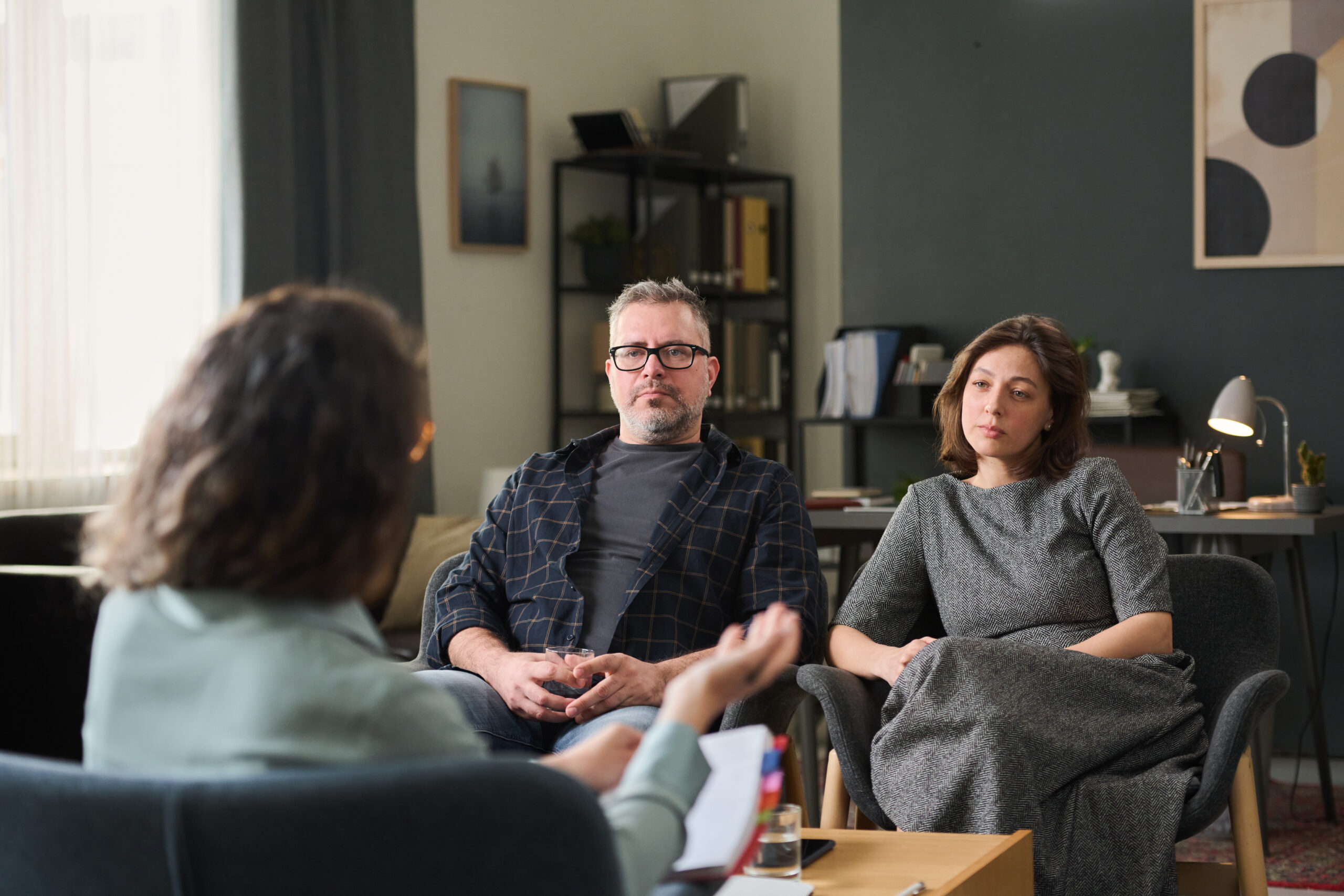One of the most critical but often overlooked components of effective couples counseling is the initial assessment. This is where a professional evaluates whether the couple is even ready for therapy. Too often, couples jump into counseling without understanding whether it is the right step for them at that time. Jonathan Glover helps to identify key dynamics within the relationship, but more importantly, he sheds light on individual issues that may need to be addressed before couples counseling can be effective. So let’s see why couples counseling doesn’t work always.
Safety Concerns
The first thing professionals look for during an assessment is safety. If there is any form of abuse—whether it be physical, sexual, emotional, or domestic—couples counseling is not the appropriate course of action. These situations require individual treatment and specialized support before any couple-focused work can begin. Without addressing these underlying safety issues, counseling could exacerbate harm.
Untreated Addictions
Addictions, whether chemical (like alcohol or drug abuse) or behavioral (like gambling or sex addiction), are another critical factor that can derail couples counseling. Untreated addictions disrupt the emotional balance in relationships, making it nearly impossible for partners to engage productively in therapy. In such cases, addiction treatment must come first before any meaningful relationship work can happen.
Mental Health Conditions
Untreated mental health issues such as schizophrenia, depression, or anxiety can also interfere with the success of couples counseling. If a partner has been diagnosed with a mental health disorder and is not following prescribed treatments, their capacity to participate in the therapy process is significantly diminished. The imbalance caused by untreated mental health issues can shift the focus away from relationship dynamics and toward individual struggles, making it difficult to progress in therapy.
Misconceptions About “50/50” Responsibility
Many couples enter therapy believing that their problems are equally shared—what some refer to as the “50/50” myth. The notion that marriage is a 50/50 partnership can be misleading, particularly when it comes to assessing the causes of harm in the relationship.
The Danger of Victim Blaming
One of the biggest risks in clinging to the 50/50 mentality is that it can lead to victim blaming. When harmful dynamics are present, such as one partner being emotionally or physically abusive, it is not helpful to imply that both partners share responsibility equally. In many cases, one partner is the perpetrator of harm, while the other is the victim. Suggesting that both individuals are equally at fault can deepen the pain and mistrust, rather than resolve it.
True Accountability
Effective couples counseling requires each partner to take responsibility for their actions—whether that’s recognizing the harm they’ve caused or acknowledging how they’ve been hurt. But responsibility should be based on the reality of the situation, not on an artificial division of blame. Counselors need to help partners understand that their contributions to the relationship are not always symmetrical, especially in cases of trauma or abuse.
Diverging Relationship Goals
One of the most challenging barriers to successful couples counseling is when partners are not aligned in their goals for the relationship. For therapy to work, both partners must be equally committed to the process of healing and improvement.
When Only One Partner Is Invested
A frequent scenario in couples counseling involves one partner who is fully invested in saving the relationship, while the other is unsure or even contemplating ending it. In these cases, counseling can become an exercise in futility. Without shared goals and a mutual desire to work on the relationship, therapy will often stall. Couples counseling is most effective when both partners are actively engaged and willing to invest time and emotional energy into the process.

Emotional Vulnerability and Core Communication
In any relationship, effective communication is key, but in couples counseling, it’s about more than just talking. Both partners must be able to speak from their core selves—meaning they must communicate without defensiveness, without using blame, and with a genuine willingness to be vulnerable.
Defensive Communication
One of the most common issues in couples counseling is the presence of defensive strategies, where partners deflect responsibility and shift blame onto the other person. This prevents meaningful dialogue and blocks the couple from addressing the core issues at hand. Until both individuals are able to lower their defenses and speak openly about their feelings, counseling sessions will likely be unproductive.
Compassion and Safety
In addition to vulnerability, partners need to create a safe emotional space for each other. This means approaching discussions with compassion and patience, allowing the other person to express their feelings without fear of judgment or backlash. Without this foundational level of emotional safety, it is unlikely that couples will be able to engage in the kind of honest, transformative conversations that are necessary for change.
The Challenge of Harm and Repair
One of the most delicate aspects of couples counseling involves addressing harm—both the harm that has been experienced and the harm that has been inflicted. In therapy, it is crucial for both partners to acknowledge and discuss these painful experiences, but also to engage in what is known as “repair work.”
Timing of Harm
Harm can occur at different times in a relationship. First, there is the initial harm, when something is said or done that causes emotional pain. The second time harm can happen is when a partner tries to address this issue, and the response is dismissive or even more harmful. Finally, harm can occur in the repair phase, when one or both partners fail to properly address or apologize for past wounds.
The Importance of Repair Work
The key to overcoming harm in a relationship is in the repair work—the process of acknowledging past mistakes and making genuine efforts to correct them. Unfortunately, many couples fail to engage in this critical step. Without repair work, unresolved issues can fester and become even more damaging over time. Effective couples counseling places a strong emphasis on helping couples learn how to repair after harm has been done, but this requires a level of maturity and emotional openness that not all couples are ready for.
Receiving and Processing Feedback
Finally, for couples counseling to be effective, both partners must be able to receive and process feedback—both from the therapist and from each other. If one or both individuals are unable or unwilling to hear constructive criticism or advice, progress in therapy will come to a grinding halt.
Feedback from the Therapist
Couples come to counseling because they are seeking guidance from a trained professional. However, if one partner becomes defensive or resistant to feedback, it can undermine the entire process. This can also create frustration for the partner who is more open to change, further widening the divide between them.
Mutual Feedback
Beyond feedback from the therapist, partners must also be able to give and receive feedback from each other. This is often where deep emotional work comes in, as each individual must be willing to hear difficult truths about themselves and the relationship. The inability to do so will significantly hinder progress.
Conclusion – Why Couples Counseling Doesn’t Work?
Couples counseling can be an incredibly powerful tool for repairing relationships, but it is not a one-size-fits-all solution. The key to success lies in the readiness of both partners—emotionally, mentally, and behaviorally—to engage in the process. Without addressing issues like safety, untreated addictions, or mental health conditions, couples counseling may be ineffective, or worse, counterproductive. Additionally, real progress requires shared goals, vulnerability, responsibility, and a willingness to repair past harm. By understanding these dynamics, couples can approach counseling with clearer expectations and a better chance at success.
To learn how we can help, reach out to us at (206) 219-0145 or info@marriagerecoverycenter.com to speak with a Client Care Specialist
Also read: Taking the Road Less Traveled to Overcome Narcissism
About Dr. Hawkins:
The internet is inundated with hyperbole and misinformation about narcissism, leaving many people confused and hopeless. Get the facts on narcissism and emotional abuse from someone who has been researching, writing about and treating narcissism and emotional abuse for over a decade.
Dr. Hawkins is a best-selling author and clinical psychologist with over three decades of experience helping people break unhealthy patterns and build healthier relationships.
He is the founder and director of the Marriage Recovery Center and the Emotional Abuse Institute which offers education, training and counseling for people who want to break free of, and heal from, emotional abuse. Whether the perpetrator of the abuse is your spouse, partner, parent, boss, friend or family member, we offer practical advice for anyone trapped in a toxic, destructive relationship.
In addition to narcissism & emotional abuse, you’ll learn about the lesser known forms of abuse, including covert abuse, reactive abuse, spiritual abuse, secondary abuse, relationship trauma and much more.







